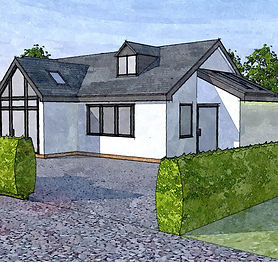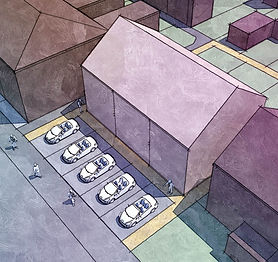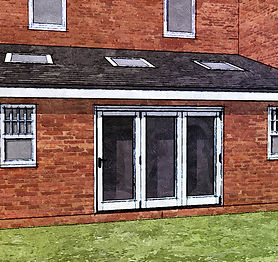
Halesowen, Dudley, West Midlands.
Full Plans Building Regulations Full Plans Application for 43 Wallwell Halesowen B634SH.
Following an initial planning appraisal it was establsied via a certificate of lawfulness thtab the extensiin spriposed and nee reneabel ebnergy development woudl be lawful development. En-Plan: Planning & Architetcure were instructed to provide detailed building plans for a Building Regulations Application. These were duly completed and submitted to Dudley Council Building Control and were duly approved.
Halesowen is a town in the Metropolitan Borough of Dudley, in the West Midlands region of England. It is situated approximately 9 miles southwest of Birmingham city center. Historically, Halesowen was part of Worcestershire, but it became part of the West Midlands metropolitan county in 1974. The town has a rich history, with evidence of settlement dating back to the Bronze Age. It grew significantly during the Industrial Revolution due to its industries like nail making, coal mining, and agriculture. Today, Halesowen is a bustling town with a mix of residential areas, commercial centers, and green spaces. It serves as a commuter town for people working in Birmingham and other nearby cities.
The Dudley Council Building Control department is responsible for ensuring that buildings in the Dudley Metropolitan Borough Council area comply with building regulations and standards. This department oversees various aspects of construction, including structural stability, fire safety, energy efficiency, and accessibility.
Some of the key responsibilities of the Dudley Council Building Control department may include:
-
Reviewing building plans and issuing building permits: Before construction can begin on a new building or renovation project, the plans must be reviewed to ensure they meet all relevant building regulations. The department issues building permits once the plans are approved.
-
Conducting site inspections: Building control officers visit construction sites at various stages of the project to inspect the work and ensure that it complies with the approved plans and building regulations. Inspections may cover areas such as foundations, structural elements, fire safety measures, and insulation.
-
Enforcing building regulations: The department has the authority to enforce compliance with building regulations. If a building is found to be in violation of regulations, the council may issue enforcement notices and take appropriate action to ensure compliance.
-
Providing guidance and advice: Building control officers offer guidance and advice to builders, developers, and homeowners to help them understand and comply with building regulations. This may include information on specific regulations, technical standards, and best practices.
Overall, the Dudley Council Building Control department plays a crucial role in ensuring that buildings within the borough are safe, sustainable, and compliant with relevant regulations.
Fitting solar panels to a house can offer various benefits, both to the homeowner and the environment. Some of the key advantages include:
-
Reduced Electricity Bills: Solar panels generate electricity from sunlight, reducing the amount of electricity you need to purchase from the grid. This can lead to significant savings on your electricity bills, especially over the long term.
-
Renewable Energy Source: Solar power is a renewable energy source, meaning it is abundant and sustainable. Unlike fossil fuels, sunlight is not depleted when used for electricity generation, making solar energy an environmentally friendly option.
-
Lower Carbon Footprint: Solar panels produce electricity without emitting greenhouse gases or other pollutants, helping to reduce carbon emissions and combat climate change. Using solar power can significantly lower your household's carbon footprint.
-
Energy Independence: By generating your own electricity with solar panels, you become less reliant on the grid and utility companies. This can provide greater energy security and protection against rising electricity prices.
-
Government Incentives: Many governments offer incentives, rebates, or tax credits to encourage the adoption of solar energy. These incentives can help offset the initial cost of installing solar panels, making them more affordable for homeowners.
-
Increased Property Value: Solar panels can increase the value of your home. Studies have shown that properties with solar panels tend to sell for higher prices and can attract more potential buyers, particularly as energy efficiency becomes increasingly important to homebuyers.
-
Long-Term Investment: Solar panels have a long lifespan (typically 25 years or more) and require minimal maintenance. Once installed, they can continue to generate electricity for decades, providing a reliable source of clean energy and a solid return on investment.
-
Energy Security: Solar panels can provide a source of electricity during power outages, especially if paired with battery storage systems. This can enhance energy security and resilience for your household.
Overall, fitting solar panels to a house can offer numerous benefits, ranging from financial savings to environmental sustainability and energy independence.
While solar panels offer numerous benefits, there are also some challenges and potential problems associated with their installation and use. Some of these include:
-
High Initial Cost: The upfront cost of purchasing and installing solar panels can be relatively high. Although prices have decreased significantly in recent years, the initial investment may still be a barrier for some homeowners, especially those with limited financial resources.
-
Intermittent Energy Production: Solar panels only generate electricity when exposed to sunlight, meaning their energy production is intermittent and dependent on weather conditions. This can lead to fluctuations in energy output, making it necessary to have alternative energy sources or storage solutions for times when sunlight is not available.
-
Space Requirements: Solar panels require adequate space for installation, typically on rooftops or open land. Not all properties may have sufficient space or suitable orientation for optimal solar panel placement, limiting their feasibility for some homeowners.
-
Maintenance Needs: While solar panels are relatively low-maintenance, they still require periodic cleaning and inspection to ensure optimal performance. Dust, dirt, and debris can accumulate on the panels, reducing their efficiency over time. Additionally, components such as inverters may require maintenance or replacement over the lifespan of the system.
-
Aesthetic Considerations: Some homeowners may be concerned about the visual impact of solar panels on the appearance of their property. While solar panel technology has improved in terms of aesthetics, some people may still find them unsightly or incompatible with the architectural style of their home.
-
Regulatory and Permitting Challenges: Installing solar panels may require obtaining permits and approvals from local authorities, which can involve navigating complex regulations and zoning restrictions. Additionally, homeowners' associations (HOAs) may have guidelines or restrictions regarding the installation of solar panels, adding another layer of complexity.
-
Potential for Damage or Failure: Solar panels are designed to withstand various weather conditions, but they can still be damaged by severe weather events such as hailstorms or high winds. Additionally, technical failures or malfunctions in system components can occur, leading to a temporary loss of energy production or the need for repairs.
-
Limited Energy Storage: While solar panels can generate electricity during the day, energy storage systems such as batteries are often needed to store excess energy for use during periods of low sunlight or at night. However, battery storage solutions can add to the overall cost of a solar power system.
Despite these challenges, advancements in solar technology, decreasing costs, and supportive policies are helping to overcome many of the barriers associated with solar panel adoption, making them an increasingly viable and attractive option for homeowners seeking clean and sustainable energy solutions.
In the UK, there are several options for homeowners who are considering installing solar panels:
-
Professional Solar Installation Companies: There are many companies specializing in the design, installation, and maintenance of solar panel systems in the UK. These companies typically offer a range of services, including site assessment, system design, obtaining permits, installation, and ongoing support. Homeowners can research and contact reputable solar installation companies in their area to request quotes and discuss their specific needs.
-
Solar Panel Suppliers: Some companies specialize in supplying solar panels and related equipment to homeowners and businesses. While they may not offer installation services themselves, they can provide guidance on selecting the right solar panels and components for a DIY installation or recommend reputable installers in the area.
-
Energy Service Companies (ESCOs): ESCOs are companies that offer energy efficiency and renewable energy solutions, including solar panel installations, often as part of broader energy management services. These companies may offer comprehensive solutions for reducing energy consumption and costs, including solar panels, energy audits, and energy-saving technologies.
-
Local Tradespeople and Contractors: In some cases, homeowners may choose to hire local tradespeople or contractors to install solar panels. While this option may be more affordable, it's essential to ensure that the individuals or companies hired have the necessary expertise, qualifications, and experience to install solar panels safely and effectively.
-
Community Energy Projects: Some communities in the UK have initiated community-led solar projects, where groups of homeowners come together to collectively invest in and install solar panel systems. These projects can provide cost savings, shared resources, and opportunities for community engagement and collaboration.
Regardless of the option chosen, homeowners should carefully research and vet potential installers or suppliers, verify their credentials, and obtain multiple quotes before making a decision. It's also advisable to consider factors such as the quality of equipment, warranties, installation timelines, and customer reviews when selecting a solar panel installer or supplier. Additionally, homeowners should ensure that any chosen installer is certified by relevant industry bodies and complies with all local regulations and standards for solar panel installations.
The optimum position for solar panels on a house roof depends on several factors, including the orientation of the roof, the angle of inclination, and any potential obstructions such as nearby trees or buildings. In general, the most effective position for solar panels in the UK is typically:
-
Orientation: Solar panels in the UK should ideally face south to maximize sunlight exposure throughout the day. South-facing panels receive the most sunlight over the course of the day, maximizing energy production. However, east- or west-facing roofs can also be suitable, although they may produce slightly less energy.
-
Angle of Inclination: The angle of inclination, or tilt, of the solar panels also plays a crucial role in maximizing energy production. In the UK, the optimal angle for solar panels is typically between 30 to 40 degrees, although this can vary depending on factors such as latitude and specific roof characteristics. Solar panels should be tilted at an angle that allows them to capture the most sunlight throughout the year.
-
Shading: It's important to consider any potential shading from nearby obstructions such as trees, buildings, or chimneys. Shading can significantly reduce the efficiency of solar panels, so it's best to position them in an area with minimal shading throughout the day.
-
Roof Slope: The slope or pitch of the roof can affect the placement of solar panels. In general, roofs with a slope between 20 to 40 degrees are well-suited for solar panel installations. Steeper roofs may require special mounting hardware, while flat roofs may require tilt frames to optimize sunlight exposure.
-
Roof Orientation: In cases where the roof orientation or shading constraints limit the options for optimal solar panel placement, alternative solutions such as ground-mounted solar panels or solar panel systems on other structures (such as garages or outbuildings) may be considered.
It's essential to conduct a thorough site assessment and consult with a professional solar installer to determine the best position for solar panels on a specific house roof. Professional installers have the expertise and tools to assess factors such as sunlight exposure, roof characteristics, and potential shading to optimize the performance of the solar panel system.
If you would like to find out more about Building Regulations or how our Planning Consultancy and Architectural Design Services can work in perfect sync to achieve a successful outcome in the planning system please contact us and we will be only too happy to talk through any questions or development proposals you may have.
READ MORE NEWS

October 2021
Property re-model approved in the village of New Works, located in Telford, Shropshire.
En-Plan: Planning & Architecture have secured planning approval for the re-model of a bungalow in Telford to add two new bedrooms at first floor and a large rear kitchen extension.
READ MORE

January 2021
Planning Application for new residential development in Haddon Street in Derby.
Outline Planning Approval granted for three new units in the Derby. The application also gained planning approval for the layout and scale of developemnt as well as access off Haddon Street.
READ MORE

November 2018
Bungalow re-model Planning Application approved in the London Green Belt in Upminster Essex.
With alterations to the roof design and balconies added to the newly created first floor bedrooms this re-model in the Green Belt has now moved to the building regs phase.
READ MORE

March 2019
Planning Application for a new kitchen extension approved in Telford.
A new kitche extension has been approved under the Prior Approval process which has added a three metre pitched roof extension to the rear of this property in Prioslee in Shropshire.
READ MORE
January 14, 2017
Planning Application for loft conversion with dormers submitted in Shrewsbury, Shropshire.
Bespoke zinc clad dormers added to this planning application to give it a contemporary stylish look and open up the converted loft space at this property in Meole Crescent.
READ MORE

July 2018
Planning Application for anew garden room approved in Great Yarmouth.
En-Plan have gained approval for a new garden room to replace the existing conservatory that did not offer the all year round usage that the owners wanted, and which the new garden room delivers.
READ MORE








